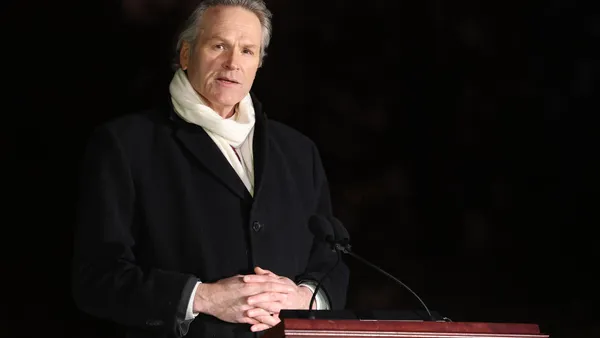Dive Brief:
-
Schools offering in-person instruction should prioritize the universal and correct use of mask wearing, as well as physical distancing that includes 6 feet between people, said the Centers for Disease Control and Prevention in new, comprehensive reopening guidance released Friday.
-
To complement the CDC guidance, the U.S. Department of Education also issued practical strategies for the safe reopening of schools, including establishing protocols for how and when masks should be removed during lunchtime, creating seating charts and staggering bell schedules.
-
Although vaccinations for teachers should be prioritized and are one of the layers of mitigation schools use to protect their communities, schools can reopen safely prior to all teachers being vaccinated if masking and distancing measures are followed, said CDC Director Rochelle P. Walensky during a virtual media briefing.
Dive Insight:
The guidance documents from CDC and the Education Department do not mandate that school buildings open or close. Those decisions should still be locally based. Instead the CDC’s science-based recommendations should be used as a roadmap as school leaders make determinations about learning formats, said Walensky. She said that limited survey data shows about 60% of schools in the country are offering some form of in-person instruction.
In addition to mask wearing and physical distancing, the CDC recommends schools focus on compliance with hand-washing, the cleaning and disinfecting of surfaces, and contact tracing, in addition to isolation and quarantine practices. The CDC previously estimated mitigation efforts in schools would cost up to $422 per student, which includes expenses for custodial staff and transportation.
Districts have said they used Coronavirus Aid, Relief and Economic Security Act funding for COVID-19 prevention expenses but that more relief is needed. Congress is considering a plan that includes $130 billion to open schools safely.
“The CDC’s updated guidance on safely reopening schools makes a clear case for why Congress must swiftly enact President Biden’s American Rescue Plan,” said a statement from Rep. Bobby Scott, D-VA, chairman of the House Education and Labor Committee. “Many schools across the country simply cannot afford to take the safety precautions that CDC recommends in order to protect students and school staff from COVID-19.”
The CDC guidance also offers a new, color-coded operational strategy to help determine the levels of transmission risk in schools based on rates of new and positive COVID-19 cases in the community.
Correct and consistent mitigation efforts need to happen to help schools open and stay open, said Walensky, highlighting a new science brief that says in-person learning has not been connected with substantial transmission in the community.
“All community members, students, families, teachers and school staff must do their part to protect each other and reduce the level of COVID-19, in their community,” Walensky said. She also stated as more is understood about the novel coronavirus, CDC may have to revisit this guidance.
The Education Department plans to issue in the coming weeks more specific guidance on strategies to serve historically underserved student populations and on topics that include SEL, staff well-being, lost instructional time, extended learning time, the digital divide and more, said Donna Harris-Aikens, the education department’s senior advisor for policy and planning, during the media briefing.
In responses to the new guidance, school administrative groups said they appreciated the CDC’s science-based approach.
“Principals want their students and educators safely back in their respective buildings, actively engaging in in-person learning and re-establishing the personal connections we’ve all missed for almost a full calendar year,” said Ronn Nozoe, CEO of the National Association of Secondary School Principals, in a statement.















